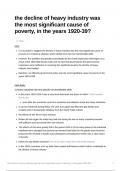Other
Essay plan: the decline of heavy industry was the most significant cause of poverty, in the years 1920-39?
- Course
- Institution
Enhance your essay-writing skills with well-structured and detailed essay plans, designed to provide clarity and support throughout your academic assignments. These essay plans offer a reliable framework to help you articulate your thoughts effectively.
[Show more]



